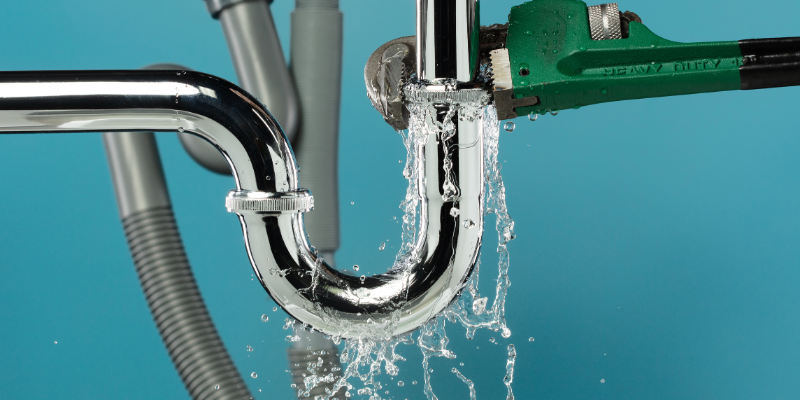
Essential Tips for Maintaining Your Mobile Home Plumbing
Maintaining your mobile home’s plumbing is essential for avoiding costly water leaks and guaranteeing long-term durability. Regular inspections are required; inspect pipes, fittings, and connections for signs of wear or corrosion, as early discovery can help prevent severe damage.
Insulating exposed pipes is critical to keeping them safe from freezing temperatures, which can cause burst pipes in winter. Pay strict attention to the condition of seals surrounding devices like sinks, toilets, and showers to avoid leaks caused by deteriorated caulking or gaskets.
Monitoring water pressure is another crucial step; high pressure can strain plumbing components, increasing the likelihood of leaks. Installing a pressure regulator can help keep levels safe throughout the system.
Avoid putting oil or big debris down your drains, which can cause clogs and water overflow. Using water leak detectors in strategic locations adds a degree of security by alerting you immediately if a leak occurs.
Shut-off valves should be tested regularly to ensure proper operation in an emergency. These preventative steps can dramatically lessen the likelihood of water-related problems in your mobile home.
Common Causes of Water Leaks in Mobile Homes
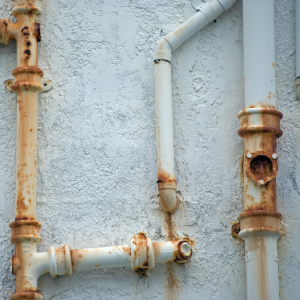
Water leaks in mobile homes are frequently caused by various factors, which can cause severe damage if not remedied swiftly. One major cause is the aging of plumbing systems, in which pipes and fittings become rusted or fragile over time, resulting in leaks.
Inadequate insulation around pipes can cause them to freeze and rupture during cold weather, resulting in water damage. Roof leaks are another prevalent problem, sometimes caused by broken or missing shingles, failing sealant around vents and skylights, or inadequate roof care.
Faulty window seals can allow rainfall to enter, and poorly placed or worn-out weatherstripping around doors can also contribute to moisture intrusion. Additionally, problems with appliances such as washing machines and water heaters can cause leaks due to broken hoses or connections.
Regular inspection and maintenance of these possible problem locations is critical for preventing water leaks in mobile homes.
Preventative Measures to Avoid Plumbing Issues in Mobile Homes
Preventative steps are critical for avoiding plumbing problems in mobile homes, since the infrastructure is more prone to water leaks. Regular inspections of pipelines and connections are required to detect early symptoms of wear or damage, hence avoiding costly repairs down the line.
Installing high-quality fixtures intended explicitly for mobile homes can also help to reduce risks, since these goods are frequently engineered to handle special strains and climatic conditions. Another critical step is to ensure sound insulation around pipes, especially in areas prone to freezing temperatures, as this helps prevent bursts.
Purchasing a pressure regulator is helpful because it maintains proper water pressure while reducing strain on the plumbing system. Furthermore, teaching occupiers about adequate water usage practices—such as not pouring grease down drains and being cautious with what they flush—can dramatically reduce the likelihood of clogs and leaks.
Regular maintenance and careful use will protect the integrity of a mobile home’s plumbing system.
Identifying and Fixing Common Mobile Home Plumbing Problems
Identifying and resolving common plumbing issues in mobile homes is critical for avoiding water leaks, which can cause substantial damage. Mobile homes can present unique plumbing issues because of their small size and building materials.
Regularly inspect pipes, joints, and connections for signs of wear and corrosion. Leaky faucets are a common issue that can waste much water if not fixed immediately; replacing worn-out washers or cartridges usually cures the problem.
Another typical issue is leakage at the base of toilets, which is usually caused by a failing wax ring seal that needs to be changed to keep water from seeping into the subfloor. Furthermore, checking water pressure is crucial since high pressure can strain pipes and fixtures, resulting in leaks.
Installing pressure regulators can help keep your plumbing system running smoothly while protecting it. Regular inspections of water heaters for leaks or corrosion at the tank or fittings are also essential, as these are common locations for potential water leaks in mobile homes.
By proactively correcting these common plumbing concerns, homeowners may easily avoid costly water damage and protect the structural integrity of their mobile homes.
Troubleshooting Low Water Pressure in Mobile Home Systems
Troubleshooting low water pressure in mobile home systems entails strategically identifying and addressing underlying issues. First, inspect the main water supply line for obstructions or leaks causing reduced flow.
Over time, silt accumulation in pipes or clogged aerators can significantly impact water pressure; thus, removing and cleaning these components is critical. Ensure that the pressure regulator is correctly set and working to avoid changes in water flow.
Also, look for any visible leaks around fixtures, as even slight drops can lessen pressure throughout the system. Regular maintenance of plumbing fittings and rapid repair of broken components will aid in maintaining ideal water pressure levels.
Observing the condition of valves and connectors guarantees that they do not contribute to inefficiencies in a mobile home’s plumbing system.
DIY Tips for Fixing Minor Leaks in Your Mobile Home
Addressing minor leaks in your mobile home using do-it-yourself methods can help prevent more significant water damage. To detect problems early, inspect locations prone to leaks regularly, such as the roof, windows, and plumbing fittings.
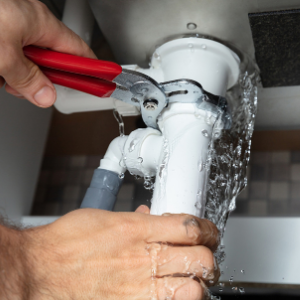
Applying sealant or caulk around windows and doors can form a waterproof barrier that prevents leakage. Check your roof for any damaged shingles or seams; repairing them as soon as possible using roofing cement or patches can help to prevent future degradation. To prevent drips, tighten plumbing connections under sinks and bathrooms regularly. Using pipe tape on threaded connections can improve their watertightness.
Installing moisture detectors in vulnerable places such as the bathroom or kitchen allows early detection of potential leaks. With these proactive actions, you can keep your mobile home structurally sound and protect it from costly water damage.
The Value of Regular Plumbing Inspections in Mobile Homes
Regular plumbing inspections in mobile homes are vital for avoiding costly water leaks and extending the life of your home. Due to their unique structural qualities, mobile homes are especially vulnerable to plumbing faults that result in water leaks.
Routine inspections by a competent plumber can detect possible issues such as worn-out seals, rusted pipes, and malfunctioning fixtures before they cause severe harm. Proactively checking under sinks, around toilets, and near water heaters allows homeowners to handle minor concerns quickly and prevent the costly repairs that are typically required after a leak has caused damage.
Regular maintenance guards against unforeseen expenses and ensures the plumbing system runs smoothly. This monitoring helps maintain ideal water pressure and prevents minor leaks from escalating into larger issues, jeopardizing the mobile home’s structural integrity.
Choosing the Right Materials for Durable Mobile Home Plumbing
Choosing the appropriate plumbing materials is critical for preventing water leaks in mobile homes. These systems require long-lasting, dependable components that can tolerate changing environmental conditions.
High-quality PEX piping is an excellent alternative for mobile home installations because it is flexible and resilient to freezing and corrosion. Furthermore, employing brass or stainless steel fittings helps extend the plumbing system’s life by creating less likely to leak connections over time.
It is also critical to ensure that the materials utilized are compatible to avoid joint or connection problems. Proper pipe insulation minimizes the danger of temperature-related leaks, particularly in colder climates.
By prioritizing these long-lasting materials and ensuring they follow industry standards, homeowners may dramatically reduce the likelihood of water leaks while maintaining an efficient plumbing system in their mobile homes.
Upgrading Old Piping Systems in Older Mobile Homes
Upgrading obsolete plumbing systems in older mobile homes is an essential step toward eliminating water leaks and extending the life of your home. Many older mobile homes use outmoded plumbing materials like galvanized steel or polybutylene, prone to corrosion and deterioration.
Replacing these with more modern options, such as PEX or copper pipes, will considerably lower the chance of leakage. PEX piping is especially useful because of its flexibility, tolerance to cold temperatures, and ease of installation.
Copper pipes are durable and reliable, making them ideal for long-term use. During the upgrade process, all joints and connections must be thoroughly inspected for any weak points that could contribute to future leaks.
Employing experienced plumbers specializing in mobile home plumbing may ensure the new piping system is constructed correctly and complies with current building codes. Investing in high-quality materials and quality helps to avoid water damage and raises the overall value of your mobile home.
If your mobile home’s plumbing problems feel overwhelming or the cost of repairs is stacking up, and you want to consider a different path, Mobile Home Cash Offer provides a fast, stress-free way to sell your mobile home for cash in North Carolina or buy a mobile home for cash in Tennessee without the hassle of repairs. Whether you’re ready for a fresh start or looking to invest, their team makes the process straightforward.
Efficient Water Heater Solutions for Mobile Homes
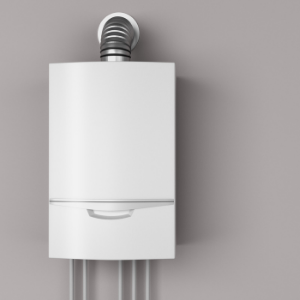
Using efficient water heater solutions is critical for preventing water leaks in mobile homes. Mobile homes may have unique plumbing systems and limited space, making choosing an adequate water heater to keep a safe and dry atmosphere essential.
Choosing a tankless water heater can be game-changing. It eliminates the need for big storage tanks, lowering the risk of leaks, and offers hot water on demand while conserving energy. Traditional water heaters require regular maintenance checks to ensure that valves and connections are in good working order, preventing possible leaks before they occur.
Installing water leak detectors near the water heater can also provide early indications of any moisture issues, allowing homeowners to fix them quickly. Providing adequate insulation around pipes connected to the mobile home’s water heater can also help to minimize condensation and subsequent leaks.
By focusing on these practical measures, mobile home owners can dramatically reduce the danger of costly water damage caused by heating system leaks.
Who Is Responsible for Water Leaks in a Mobile Home Park?
Who’s accountable for handling water leaks in a mobile home park often depends on where the leak happens and what the rental agreement states. Leaks inside a mobile home unit are usually the homeowner’s responsibility. That means any issues in the pipes, faucets, or fixtures inside the unit itself fall to the resident to repair.
If the leak surfaces in common areas—like the buried pipes or fittings that the park installed—park management or the owner must step in and fix it. The dividing line is where the home’s private space ends and the park’s shared infrastructure begins.
Residents and park management should familiarize themselves with the relevant sections of the lease that detail leak responsibilities to prevent disputes and get repairs underway without delay. Adding scheduled inspections and routine maintenance from both sides can catch small leaks before they escalate.
Open dialogue is crucial. Clear communication means a tiny drip can be reported and addressed before it becomes a bigger flood, protecting the resident’s home and the park’s plumbing.
How to Find a Water Leak in a Mobile Home?
Finding a leak in a mobile home matters a lot if you want to save your space from expensive repairs and keep the structure solid. Start in the usual suspect spots: beneath sinks, around toilets, and by the water heater, since those areas tend to give you the first clues.
Scan for any telltale signs—pink streaks, curled paint, or swollen boards—that something is off. When everything is off, pause and listen for the sound of dripping or flowing water. Try moisture meters or infrared cameras if a leak seems trapped behind walls or under the floor. Look for pooled moisture around the skirting or any pipes connecting to the home.
Finally, look at the water meter: if the needle keeps moving even after you’ve shut off every tap, a hidden leak is likely somewhere in the pipes. By checking these areas and using the right tools, you can catch water leaks early and with less fuss.
What Happens If Water Gets Under a Mobile Home?
If water gets under a mobile home, it can spark a chain reaction that endangers the house and its inhabitants. Moisture pooled beneath tends to soft-rot the wood subfloor, and what begins as a small spongy patch can lead to expensive repairs and, especially, dangerous structural weakening.
The same moisture becomes a cozy breeding ground for mold and mildew, which can seep into the air you breathe and trigger health problems long after seeing them. The insulation, too, begins to sag and lose its dust-fighting, heat-holding grip, causing your HVAC system to work harder and your utility bill to climb.
Standing water beneath the home doubles as a return ticket for unwanted guests: termites, mice, even snakes. Water around the support piers and foundation can encourage the entire structure to settle unevenly, leading to drywall cracks and doors and windows that refuse to latch.
The message is simple: stay vigilant. Keep gutters and drainage in excellent working order, and crawl underneath for the telltale slip of damp wood or the musty scent that shouldn’t be there.
Does Homeowners Insurance Cover Water Leaks?
As for the financial aftermath, it helps to know what your homeowners’ policy will likely cover. Most policies shield you from sudden, accidental leaks—things like a rogue water heater or a split pipe—yet they often turn their backs on gradual leaks or flooding from the outside. Keep a close eye to stay ahead of the curve.
Yet, damage from slow leaks stemming from deferred maintenance or normal aging often slips through the cracks of standard policy protections. Mobile homeowners should regularly inspect plumbing lines, connectors, and appliances for signs—such as discoloration, corrosion, or bulging—that suggest imminent failure.
Integrating a leak detection system adds another layer of defense; many systems can spot moisture and automatically shut off the water supply, potentially curtailing the extent of damage. Review the homeowner’s insurance policy for exact language on water-related perils, as some cover appliance failures while others explicitly exclude seepage over time. A supplemental water damage endorsement may provide the added peace of mind.
Combining regular service checks with timely policy adjustments allows homeowners to create a sturdy barrier against the expense and stress that water leaks can inflict.
Whether you’re looking to move on from constant repairs or hoping to find a reliable mobile home, Mobile Home Cash Offer is here to make the process easy—offering fast, fair solutions for anyone looking to sell or buy a mobile home for cash with confidence. Contact us at 214-444-6375 today to get your offer!
Helpful Mobile Home Blogs
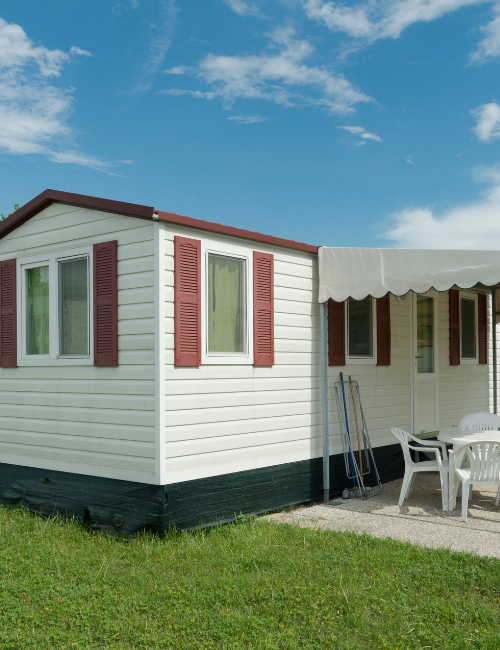
| ROUTINE MAINTENANCE | RUST |
